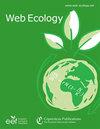在巴西南部的农业休耕区,人工栖木增加了鸟类介导的种子雨
IF 2.4
3区 环境科学与生态学
Q2 ECOLOGY
引用次数: 0
摘要
摘要恢复的主要障碍之一是退化地区的水蛭的到来。然而,在景观中没有树木的开放区域,这一过程可能会受到阻碍。为此,利用人工栖木吸引鸟类散布种子,并为鸟类提供降落区域,以加强种子的排泄。本研究的目的是评估人工栖木距离对农业休耕区种子雨多样性和组成的影响,包括外来入侵植物。我们还旨在记录和描述可能作为种子传播者的鸟类物种。因此,我们在距离森林碎片5、25和50米的三种不同距离处使用了人工栖木。每隔一段距离在栖木下设置4个种子诱捕器,4个对照种子诱捕器之间间隔7.5 m。此外,我们在距离边缘5米的森林碎片内放置了4个种子陷阱。对使用人工栖地的鸟类进行了80 h的重点观察。所有处理共取样24655粒种子。在种子丰度和丰富度方面,人工栖木、对照捕种器和森林捕种器存在显著差异。种子沉降量随距离森林碎片(50、25和5 m)的增加而增加。排序结果表明,该地区存在3个植物种子群落,其中以森林群落最为明显。外来入侵种Pittosporum undulatum (Australian cheesewood)在种子雨中的丰度排名第三。利用人工栖木对12科24种鸟类进行了观测。暴龙科是最具代表性的。研究表明,人工栖木是吸引鸟类的有效结构,增加了种子物种的丰富度和丰度。25米和50米的人工栖木可能更有效,因为它为鸟类提供了更大的能见度。因此,人工栖木可以有效地增加休耕地区的种子雨,但在有外来物种存在的景观中应谨慎使用。这些发现有助于增加对克服生态恢复的第一个障碍的认识,即退化地区的散居动物的到来,并表明鸟类在这一过程中的重要性。本文章由计算机程序翻译,如有差异,请以英文原文为准。
Artificial perches increase bird-mediated seed rain in agricultural fallow area in southern Brazil
Abstract. One of the main barriers to restoration is the arrival of diaspores in degraded areas. However, this process can be hampered in open areas without
trees in the landscape. For that, artificial perches are used to attract and provide a landing area for avian seed dispersers, to enhance seed
rain. Our objective was to evaluate the effect of the distance of artificial perches in relation to a forest fragment on the diversity and
composition of seed rain in an agricultural fallow area, including alien invasive plant species. We also aimed to record and characterize the bird
species that potentially act as seed dispersers. Thus, we used artificial perches at three different distances from a forest fragment (5, 25, and
50 m). Four seed traps were arranged under the perches at each distance, and four control seed traps were interspersed with these and distanced at 7.5 m. Furthermore, we placed four seed traps inside the forest fragment at 5 m from the edge. We also carried out 80 h of focal observation of the avifauna that used artificial perches. A total of 24 655 seeds were sampled across all treatments. There was a significant difference in seed abundance and richness between artificial perches, control seed traps, and forest seed traps. Seed deposition increased with distance from the forest fragment (50, 25, and 5 m). An ordination procedure indicated the formation of three plant seed communities, with the forest community being most distinct. The invasive exotic species Pittosporum undulatum (Australian cheesewood) was the third most abundant in the seed rain. We observed 24 bird species from 12 families using artificial perches. The Tyrannidae family was the most represented. We showed that artificial perches are efficient structures for attracting birds, increasing the richness and abundance of seed species. Artificial perches at 25 and 50 m were more efficient possibly due to the provision of greater visibility for birds. Therefore, artificial perches are efficient in increasing seed rain in the fallow area but should be used with caution in landscapes with the presence of alien species. These findings contribute to increasing knowledge about overcoming the first barrier to ecological restoration, which is the arrival of diaspores in degraded areas, and
showing the importance of birds in this process.
求助全文
通过发布文献求助,成功后即可免费获取论文全文。
去求助
来源期刊

Web Ecology
Agricultural and Biological Sciences-Ecology, Evolution, Behavior and Systematics
CiteScore
4.60
自引率
0.00%
发文量
6
审稿时长
17 weeks
期刊介绍:
Web Ecology (WE) is an open-access journal issued by the European Ecological Federation (EEF) representing the ecological societies within Europe and associated members. Its special value is to serve as a publication forum for national ecological societies that do not maintain their own society journal. Web Ecology publishes papers from all fields of ecology without any geographic restriction. It is a forum to communicate results of experimental, theoretical, and descriptive studies of general interest to an international audience. Original contributions, short communications, and reviews on ecological research on all kinds of organisms and ecosystems are welcome as well as papers that express emerging ideas and concepts with a sound scientific background.
 求助内容:
求助内容: 应助结果提醒方式:
应助结果提醒方式:


